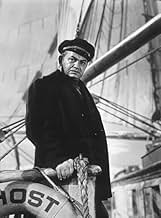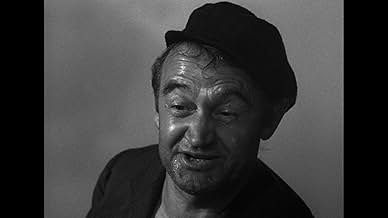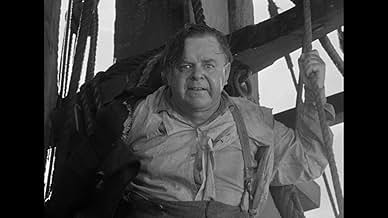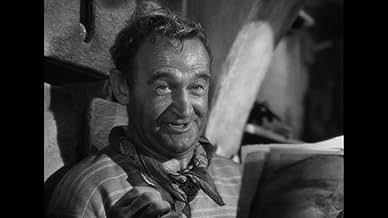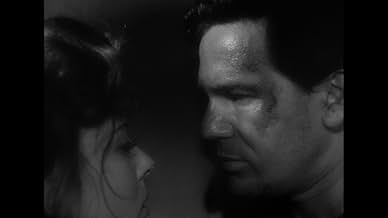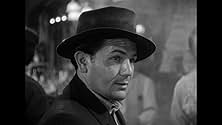VALUTAZIONE IMDb
7,5/10
4838
LA TUA VALUTAZIONE
Dopo essere stati ripescati da un marinaio, tre fuggitivi si ritrovano imprigionati nella nave di un brutale capitano che rifiuta di portarli a riva, costringendoli a escogitare un piano di ... Leggi tuttoDopo essere stati ripescati da un marinaio, tre fuggitivi si ritrovano imprigionati nella nave di un brutale capitano che rifiuta di portarli a riva, costringendoli a escogitare un piano di fuga durante un ammutinamento.Dopo essere stati ripescati da un marinaio, tre fuggitivi si ritrovano imprigionati nella nave di un brutale capitano che rifiuta di portarli a riva, costringendoli a escogitare un piano di fuga durante un ammutinamento.
- Regia
- Sceneggiatura
- Star
- Candidato a 1 Oscar
- 2 candidature totali
Ernie Adams
- Pickpocket
- (non citato nei titoli originali)
Cliff Clark
- First Detective
- (non citato nei titoli originali)
Jeane Cowan
- Singer
- (non citato nei titoli originali)
Richard Cramer
- Bartender
- (non citato nei titoli originali)
William Gould
- Second Detective
- (non citato nei titoli originali)
Ralf Harolde
- Agent Getting Johnson Shanghaied
- (non citato nei titoli originali)
Oscar 'Dutch' Hendrian
- Crewman
- (non citato nei titoli originali)
Recensioni in evidenza
It's amazing what a really good actor can pull off. In the Jack London novel on which this film was loosely based, Wolf Larson is tall, blond, Scandinavian, an "ubermensch" flaunting his invincible strength and power over other men. Edward G. Robinson was very short and dark, almost gnome-like with little stubby hands, a homely face and nasal voice. Yet somehow he fills this improbable role, making Larson at once larger than life and credibly human.
Larson is, of course, the "sea wolf" of the title, captain of the Ghost, a mysterious, perpetually fog-enshrouded schooner. Manned by a crew of brutal and brutalized men, the ship is ostensibly hunting seals, but its real destination is a show-down with Wolf's brother, the even more colorfully named Death Larson. We never learn much about this sibling feud, or about the backgrounds of the major characters. Aside from Larson, there is George Leach (John Garfield), who signs on with the ship to escape a prison rap, and two passengers rescued from the wreck of a ferry in San Francisco harbor: Ruth (Ida Lupino), an escaped convict, and Van Weyden, a well-bred writer who becomes, as observer and interpreter of the action, the film's central consciousness. Larson refuses to put the two castaways ashore, seemingly out of pure spite. Leach plots to escape the ship, and the threat of mutiny hangs in the air.
As this summary suggests, the movie's plot is as foggy as its atmosphere, but this doesn't matter very much. The atmosphere, at once raffish and eerie, and the beautifully drawn characters provide plenty of interest, and there is also a serious and compelling theme. Larson's motto (from Milton) is "better to reign in hell than serve in heaven." Van Weyden, who becomes the secretly intellectual captain's confidant, realizes that Larson is afraid to leave his ship because only as its captain can he enjoy absolute power; on shore he would be forced to compete with his equals and betters. His sport is humiliating his victims and stripping them of dignity and self-respect. He gratuitously insults and torments all those who attempt to challenge him: in addition to Leach and Ruth, there is Louis (the excellent Gene Lockhart), a broken, alcoholic doctor who tries to recover his dignity after saving Ruth's life with a transfusion of Leach's blood. Larson won't let him, of course, and his desperate response prompts the writer's comment, "There is a price no man will pay for living." Larson even turns against Cookie (Barry Fitzgerald), his most loyal crew-member. Fitzgerald is spectacularly loathsome, shrieking with laughter and scuttling around his galley like a demonic leprechaun.
John Garfield, to his credit, was never reluctant to take supporting roles in films he admired. His part here, while secondary, is a pip: a defiant young roughneck, smarting with wounded pride, looking terrific in a tattered sweater and fisherman's cap. He gets a great introduction in the first scene, walking into a waterfront dive where he brushes off a pickpocket ("If you find anything in there, brother, I'll share it with you") and knocks out the recruiter who tries to slip him a mickey. On board the Ghost, he's the only one of the sailors who rebels against Larson; when ordered to address the captain with respect, he manages to make "sir" sound like a four-letter word. "Don't worry," he says before the transfusion, "This kind of blood never cools off."
Ida Lupino is wonderful (when was she not?) as the convict who has lost her spirit; her pathetic lady-like act keeps giving way to flashes of anger and underlying sadness. She and Garfield make a perfect couple, and their romance, which could have seemed like a sop to the box office, is deeply touching. Like Garfield, Lupino regularly played tough, resentful hard-luck kids. But her pale, waif-like delicacy and wistfulness contrast nicely with Garfield's rough-hewn sturdiness and combustible temper. They have three good scenes together: one where she finds him huddled like a whipped puppy in the ship's hold (he has been beaten after assaulting the captain) and they smoke cigarettes together. Initially hostilehe tells her scornfully that he only stood up for her because "I can't even stand to see a dog beg, much less a human being"they quickly bond. He urges her to keep fighting and boasts that Larson can never break his spirit, while she wearily responds that nothing makes any difference to her anymore. Later they talk in a doorway, Ida in her nightgown, and he touches her arm, realizing that his own blood is running through it. They don't kiss, but their chemistry is palpable. Finally they play a love scene on either side of a locked iron door, whispering to each other with their lips touching the wall between them.
Eventually Larson's invincibility starts to crack, as he suffers from crippling migraines and hysterical blindness. He remains too vicious to arouse any pity, but Robinson makes him a fascinating monster. He conveys such a dominant, overpowering will that you hardly notice he's not physically imposing; his sneering voice, nasty laugh and devious intelligence make him genuinely scary. The intense performances of the whole cast knit together this unusual blend of boy's-adventure-story entertainment and serious drama, a classic of the Warner Brothers' minor-key style.
Larson is, of course, the "sea wolf" of the title, captain of the Ghost, a mysterious, perpetually fog-enshrouded schooner. Manned by a crew of brutal and brutalized men, the ship is ostensibly hunting seals, but its real destination is a show-down with Wolf's brother, the even more colorfully named Death Larson. We never learn much about this sibling feud, or about the backgrounds of the major characters. Aside from Larson, there is George Leach (John Garfield), who signs on with the ship to escape a prison rap, and two passengers rescued from the wreck of a ferry in San Francisco harbor: Ruth (Ida Lupino), an escaped convict, and Van Weyden, a well-bred writer who becomes, as observer and interpreter of the action, the film's central consciousness. Larson refuses to put the two castaways ashore, seemingly out of pure spite. Leach plots to escape the ship, and the threat of mutiny hangs in the air.
As this summary suggests, the movie's plot is as foggy as its atmosphere, but this doesn't matter very much. The atmosphere, at once raffish and eerie, and the beautifully drawn characters provide plenty of interest, and there is also a serious and compelling theme. Larson's motto (from Milton) is "better to reign in hell than serve in heaven." Van Weyden, who becomes the secretly intellectual captain's confidant, realizes that Larson is afraid to leave his ship because only as its captain can he enjoy absolute power; on shore he would be forced to compete with his equals and betters. His sport is humiliating his victims and stripping them of dignity and self-respect. He gratuitously insults and torments all those who attempt to challenge him: in addition to Leach and Ruth, there is Louis (the excellent Gene Lockhart), a broken, alcoholic doctor who tries to recover his dignity after saving Ruth's life with a transfusion of Leach's blood. Larson won't let him, of course, and his desperate response prompts the writer's comment, "There is a price no man will pay for living." Larson even turns against Cookie (Barry Fitzgerald), his most loyal crew-member. Fitzgerald is spectacularly loathsome, shrieking with laughter and scuttling around his galley like a demonic leprechaun.
John Garfield, to his credit, was never reluctant to take supporting roles in films he admired. His part here, while secondary, is a pip: a defiant young roughneck, smarting with wounded pride, looking terrific in a tattered sweater and fisherman's cap. He gets a great introduction in the first scene, walking into a waterfront dive where he brushes off a pickpocket ("If you find anything in there, brother, I'll share it with you") and knocks out the recruiter who tries to slip him a mickey. On board the Ghost, he's the only one of the sailors who rebels against Larson; when ordered to address the captain with respect, he manages to make "sir" sound like a four-letter word. "Don't worry," he says before the transfusion, "This kind of blood never cools off."
Ida Lupino is wonderful (when was she not?) as the convict who has lost her spirit; her pathetic lady-like act keeps giving way to flashes of anger and underlying sadness. She and Garfield make a perfect couple, and their romance, which could have seemed like a sop to the box office, is deeply touching. Like Garfield, Lupino regularly played tough, resentful hard-luck kids. But her pale, waif-like delicacy and wistfulness contrast nicely with Garfield's rough-hewn sturdiness and combustible temper. They have three good scenes together: one where she finds him huddled like a whipped puppy in the ship's hold (he has been beaten after assaulting the captain) and they smoke cigarettes together. Initially hostilehe tells her scornfully that he only stood up for her because "I can't even stand to see a dog beg, much less a human being"they quickly bond. He urges her to keep fighting and boasts that Larson can never break his spirit, while she wearily responds that nothing makes any difference to her anymore. Later they talk in a doorway, Ida in her nightgown, and he touches her arm, realizing that his own blood is running through it. They don't kiss, but their chemistry is palpable. Finally they play a love scene on either side of a locked iron door, whispering to each other with their lips touching the wall between them.
Eventually Larson's invincibility starts to crack, as he suffers from crippling migraines and hysterical blindness. He remains too vicious to arouse any pity, but Robinson makes him a fascinating monster. He conveys such a dominant, overpowering will that you hardly notice he's not physically imposing; his sneering voice, nasty laugh and devious intelligence make him genuinely scary. The intense performances of the whole cast knit together this unusual blend of boy's-adventure-story entertainment and serious drama, a classic of the Warner Brothers' minor-key style.
Jack London's novels usually dealt with the interrelationship between man and nature. Herbert Spencer had corrupted and popularized the theories of Charles Darwin as "the survival of the fittest," something Darwin never wrote and wouldn't have believed anyway. In London's best works Spencer's jargon is not promoted but rather utilized to discredit the doctrine which was being bastardized by the robber barons in the pre-Great Depression world of big business to justify their millions of largely untaxed loot. Not surprisingly London was a socialist. Power hungry, egotistical humans are depicted as animals whose characteristics they share. Wolf Larsen is not unlike a wolf who stalks his prey to devour it one piece at a time.
Though there are significant differences between the novel and the movie, "The Sea Wolf" remains true to form. London would have undoubtedly approved of the film version of perhaps his best work. Wolf Larsen who identifies with the master poet John Milton not just because Milton went blind in a similar way that Larsen was going blind but also because Satan in the serpent as described by Milton in "Paradise Lost" believes many notions that Larsen believes. That he underlines the famous passage, "Better to reign in Hell, than serve in Heaven" is indicative of how Larsen views himself.
The consummate actor Edward G. Robinson, who could play any role as if he were that particular character, breathes life into this very complex personality. Obviously Larsen has a conscience and is not totally corrupt and evil. During the famous, telling scene when Dr. Louis "Louie" J. Prescott played to perfection by Gene Lockhart is kicked down the stairs by Larsen just after the sea wolf has told the crew not to pick on him anymore, the viewer can tell by the look in Larsen's eyes and the expression on his face that he has a degree of remorse for what happens next. Satan in the serpent would not possess any remorse. The true embodiment of evil is the Igor-type creature everyone calls Cooky (Barry Fitzgerald, playing against type and giving perhaps the best performance of his career). Full of hate, insidiously mocking his crew mates and anyone else with whom he makes contact, this vile little man shows no redeeming qualities whatsoever. In some ways Larsen is actually jealous of Cooky for being more iniquitous than himself, hence why Larsen turns on him.
A major weakness is the somewhat frivolous romance between George Leach (John Garfield) and Ruth Brewster (Ida Lupino). Both fugitives, it is quite understandable how the two are attracted to each other but that the two would become so close so soon is highly unlikely. Garfield and the multi-talented Lupino were two of the best Thespians of their generation so expect standout performances by each.
A somewhat wild card in the acting department is Alexander Knox as the sensitive writer Humphrey Van Weyden. Later Knox would receive accolades playing President Woodrow Wilson. He does so well in this film the viewer wonders what would have happened had Knox not become overly identified as Wilson to the extent that he never again got a suitable role for his talents. London obviously split his personality when he wrote himself into "The Sea Wolf." His literary side is represented by Humphrey, his adventurous romantic side by Leach.
Though there are significant differences between the novel and the movie, "The Sea Wolf" remains true to form. London would have undoubtedly approved of the film version of perhaps his best work. Wolf Larsen who identifies with the master poet John Milton not just because Milton went blind in a similar way that Larsen was going blind but also because Satan in the serpent as described by Milton in "Paradise Lost" believes many notions that Larsen believes. That he underlines the famous passage, "Better to reign in Hell, than serve in Heaven" is indicative of how Larsen views himself.
The consummate actor Edward G. Robinson, who could play any role as if he were that particular character, breathes life into this very complex personality. Obviously Larsen has a conscience and is not totally corrupt and evil. During the famous, telling scene when Dr. Louis "Louie" J. Prescott played to perfection by Gene Lockhart is kicked down the stairs by Larsen just after the sea wolf has told the crew not to pick on him anymore, the viewer can tell by the look in Larsen's eyes and the expression on his face that he has a degree of remorse for what happens next. Satan in the serpent would not possess any remorse. The true embodiment of evil is the Igor-type creature everyone calls Cooky (Barry Fitzgerald, playing against type and giving perhaps the best performance of his career). Full of hate, insidiously mocking his crew mates and anyone else with whom he makes contact, this vile little man shows no redeeming qualities whatsoever. In some ways Larsen is actually jealous of Cooky for being more iniquitous than himself, hence why Larsen turns on him.
A major weakness is the somewhat frivolous romance between George Leach (John Garfield) and Ruth Brewster (Ida Lupino). Both fugitives, it is quite understandable how the two are attracted to each other but that the two would become so close so soon is highly unlikely. Garfield and the multi-talented Lupino were two of the best Thespians of their generation so expect standout performances by each.
A somewhat wild card in the acting department is Alexander Knox as the sensitive writer Humphrey Van Weyden. Later Knox would receive accolades playing President Woodrow Wilson. He does so well in this film the viewer wonders what would have happened had Knox not become overly identified as Wilson to the extent that he never again got a suitable role for his talents. London obviously split his personality when he wrote himself into "The Sea Wolf." His literary side is represented by Humphrey, his adventurous romantic side by Leach.
The London classic has been filmed many times, but never better than here. It's Warner Bros. operating on all 8 cylinders, from casting, to directing, to art department and special effects. So who better to play the maniacal captain than Edward G, Robinson at his snarling prime, or the rebellious ex-con than John Garfield at his defiant prime, or the downtrodden girl than Ida Lupino at her soulful prime. Together they're a dynamite cast, and even the snobbish Alexander Knox manages his literary role in fairly sympathetic fashion. It's atmospheric the whole way with the aptly named Ghost slipping through one fog bank after another.
The Robert Rossen adaptation is less philosophical than others. Robinson's Wolf Larson acts more out of psychological compulsion than philosophical principle. His battle of wits with Knox's Humphrey van Weyden is more about Freudian ego than the merits of a Nietschean superman. Larson desires power to prove his own self and not to prove a larger point about ruthlessness and the struggle to survive. I suspect that had the movie been made a few years later, Hitlerian comparisons would have been drawn. Then too, when there's talk of the ship's "downtrodden" crew being freed at last, it's likely the leftish Rossen has more than a ship's crew in mind. Too bad that the commanding Howard deSilva doesn't have a larger role which would have made the outlaw ship even more hellish.
Note the informal wedding vows exchanged between Lupino and Garfield at movie's end. The lines are rather clumsy and out-of-step with the rest of the script. I suspect the censors required some such vows before the couple were allowed to live together on a deserted island after leaving the ship. Even though this seems a reach, I gather censorship concerns could indeed reach to such an implied level. Be that as it may, the Robinson performance is powerfully riveting and not to be missed. All in all, the movie remains a fine example of ensemble film-making and a tribute to Hollywood's old studio system.
The Robert Rossen adaptation is less philosophical than others. Robinson's Wolf Larson acts more out of psychological compulsion than philosophical principle. His battle of wits with Knox's Humphrey van Weyden is more about Freudian ego than the merits of a Nietschean superman. Larson desires power to prove his own self and not to prove a larger point about ruthlessness and the struggle to survive. I suspect that had the movie been made a few years later, Hitlerian comparisons would have been drawn. Then too, when there's talk of the ship's "downtrodden" crew being freed at last, it's likely the leftish Rossen has more than a ship's crew in mind. Too bad that the commanding Howard deSilva doesn't have a larger role which would have made the outlaw ship even more hellish.
Note the informal wedding vows exchanged between Lupino and Garfield at movie's end. The lines are rather clumsy and out-of-step with the rest of the script. I suspect the censors required some such vows before the couple were allowed to live together on a deserted island after leaving the ship. Even though this seems a reach, I gather censorship concerns could indeed reach to such an implied level. Be that as it may, the Robinson performance is powerfully riveting and not to be missed. All in all, the movie remains a fine example of ensemble film-making and a tribute to Hollywood's old studio system.
This is probably the best remembered version of the Jack London tale. A ruthless and savvy sea captain(Edward G. Robinson)reluctantly rescues a shipwreck and puts his unplanned passengers to work on his ship. Soon he is forced to deal with an enraged, rebellious crew. Directed expertly by Michael Curtiz.
Robinson is great as the meglomaniacal master of the ship. Outstanding performances from Ida Lupino and John Garfield. Also in supporting roles are Howard Da Silva, Barry Fitzgerald and Alexander Knox. Watch this in tandem with another Curtiz swashbuckler SEA HAWK(1940)along with popcorn shrimp and dramamine...talk about adventure.
Robinson is great as the meglomaniacal master of the ship. Outstanding performances from Ida Lupino and John Garfield. Also in supporting roles are Howard Da Silva, Barry Fitzgerald and Alexander Knox. Watch this in tandem with another Curtiz swashbuckler SEA HAWK(1940)along with popcorn shrimp and dramamine...talk about adventure.
"I've spit in the eye of better men than you for saying less", boatswain John Garfield snarls at sadistic captain Edward G. Robinson in this gritty film noir, set in the open sea, but fenced in, very noir-like, by constant dense fog.
I believe Raoul Walsh would have made a more dynamic film over Jack London's novel than Michael Curtiz did, but it is still a pretty good watch any day of the week. Robert Rossen wrote the screenplay which is well-structured, but far too literal and talkative for the pacing of a dramatic work of art. The lighting of the set, basically just the ship 'The Ghost', is brilliant, Erich Wolfgang Korngold's score must count among his best, highly effective and evocative.
Acting is on a very high level, with Robinson grabbing a first prize for his portrayal of the complex sadist 'Wolf' Larson. John Garfield is his swarthy and sexy adversary, and Barry Fitzgerald turns his signature role of the Irish leprechaun on its head with his vicious, diabolical snitch of a sailor, truly scary, a virtuoso performance.
I believe Raoul Walsh would have made a more dynamic film over Jack London's novel than Michael Curtiz did, but it is still a pretty good watch any day of the week. Robert Rossen wrote the screenplay which is well-structured, but far too literal and talkative for the pacing of a dramatic work of art. The lighting of the set, basically just the ship 'The Ghost', is brilliant, Erich Wolfgang Korngold's score must count among his best, highly effective and evocative.
Acting is on a very high level, with Robinson grabbing a first prize for his portrayal of the complex sadist 'Wolf' Larson. John Garfield is his swarthy and sexy adversary, and Barry Fitzgerald turns his signature role of the Irish leprechaun on its head with his vicious, diabolical snitch of a sailor, truly scary, a virtuoso performance.
Lo sapevi?
- QuizThe first movie to have its world premiere on a ship: the luxury liner "America", during a trip from San Francisco to Los Angeles.
- BlooperUntil the era of the 1st World War, the practice on board a ship was to call orders for the helmsman to move the tiller either to port or to starboard. Calling "hard a-port" meant moving the tiller to port, which means the rudder and the vessel, will then move to starboard. With wheel steering, putting the helm/tiller to port, means spinning the wheel to starboard. Ships no longer use this system - these days helm directions refer to the desired turn of the rudder/vessel. The James Cameron movie "Titanic" also contained a similar scene, which generated a lot of puzzlement. It IS a bit confusing at first, unless one is a sailor and is familiar with tiller steering.
- Citazioni
Humphrey Van Weyden: There's a price no man will pay for living.
- Versioni alternativeThe film was cut by approximately 12 minutes down to less than 90 minutes for re-issue. The deleted footage consisted of little, but integral, moments throughout the story which added considerably to the quality of the film as a whole. For many years, the only known existing print of the original 99-minute theatrical version was a 16mm print which belonged to the film's star, John Garfield. However, Warner Brothers studio recently discovered a 35mm print of this original version at the Museum of Modern Art in New York City. It was subsequently restored and used for distribution on DVD and Blu Ray.
- ConnessioniEdited into La nave fantasma (1993)
- Colonne sonoreHello! Ma Baby
(uncredited)
Music by Joseph E. Howard
Lyrics by Ida Emerson
Played on piano and sung by Jeane Cowan in the bar
I più visti
Accedi per valutare e creare un elenco di titoli salvati per ottenere consigli personalizzati
Dettagli
- Data di uscita
- Paese di origine
- Lingua
- Celebre anche come
- The Sea Wolf
- Luoghi delle riprese
- Azienda produttrice
- Vedi altri crediti dell’azienda su IMDbPro
Botteghino
- Budget
- 1.013.217 USD (previsto)
- Lordo in tutto il mondo
- 6192 USD
- Tempo di esecuzione1 ora 40 minuti
- Colore
- Proporzioni
- 1.37 : 1
Contribuisci a questa pagina
Suggerisci una modifica o aggiungi i contenuti mancanti



